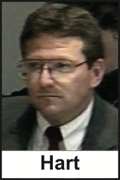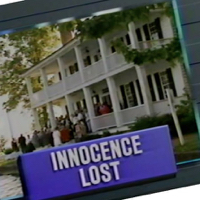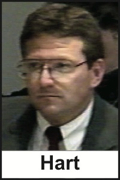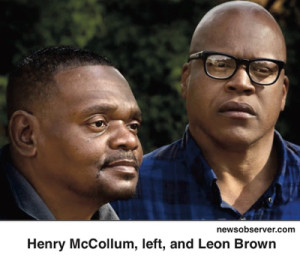Rascals case in brief
In the beginning, in 1989, more than 90 children at the Little Rascals Day Care Center in Edenton, North Carolina, accused a total of 20 adults with 429 instances of sexual abuse over a three-year period. It may have all begun with one parent’s complaint about punishment given her child.
Among the alleged perpetrators: the sheriff and mayor. But prosecutors would charge only Robin Byrum, Darlene Harris, Elizabeth “Betsy” Kelly, Robert “Bob” Kelly, Willard Scott Privott, Shelley Stone and Dawn Wilson – the Edenton 7.
Along with sodomy and beatings, allegations included a baby killed with a handgun, a child being hung upside down from a tree and being set on fire and countless other fantastic incidents involving spaceships, hot air balloons, pirate ships and trained sharks.
By the time prosecutors dropped the last charges in 1997, Little Rascals had become North Carolina’s longest and most costly criminal trial. Prosecutors kept defendants jailed in hopes at least one would turn against their supposed co-conspirators. Remarkably, none did. Another shameful record: Five defendants had to wait longer to face their accusers in court than anyone else in North Carolina history.
Between 1991 and 1997, Ofra Bikel produced three extraordinary episodes on the Little Rascals case for the PBS series “Frontline.” Although “Innocence Lost” did not deter prosecutors, it exposed their tactics and fostered nationwide skepticism and dismay.
With each passing year, the absurdity of the Little Rascals charges has become more obvious. But no admission of error has ever come from prosecutors, police, interviewers or parents. This site is devoted to the issues raised by this case.
On Facebook
Click for earlier Facebook posts archived on this site
Click to go to
Today’s random selection from the Little Rascals Day Care archives….
Click for earlier Facebook posts archived on this site
Click to go to
Today’s random selection from the Little Rascals Day Care archives….
Bill Hart used day-care moms as dating pool
 Aug. 6, 2012
Aug. 6, 2012
Let’s say you were a special deputy attorney general called in from Raleigh to help prosecute the Little Rascals case. Now imagine: What would be the most inappropriate, the most ethically questionable way you could possibly spend your spare time in Edenton? How about starting to date the mother of one of the alleged victims?
Yes, that’s exactly what Bill Hart chose to do. He and Patricia A. Kephart had been involved for months even before Bob Kelly’s trial began.
Readers of this blog won’t be surprised to learn that Hart denied any impropriety and blamed the defense for trying “to divert attention from the case.”
But Rich Rosen, professor of criminal procedure at the UNC Chapel Hill School of Law, told the News & Observer of Raleigh (Dec. 20, 1991) that “It certainly raises questions in my mind. A prosecutor is not supposed to have any personal involvement or interest in the case.”
One question raised in my own mind: Unlikely, yes, but what if Hart had experienced a pang of doubt about the validity of the prosecution’s case? Would he have been able to admit that to his girlfriend (much less to his fellow prosecutors)?
At the conclusion of the state’s case, prosecutors dropped charges related to Kephart’s daughter. Hart and Kephart later married.
25 years ago: ‘Innocence Lost’ debuts
 May 7, 2016
May 7, 2016
Twenty-five years ago today, “Frontline” aired Ofra Bikel’s landmark two-hour documentary on the Little Rascals Day Care case. It turned out to be the first of three installments over the next six years.
About the “satanic ritual abuse” day-care panic of the 1980s and early ’90s, historian Mary De Young says:
“Ofra Bikel certainly pounded a nail in its coffin. Her excellent work on the Little Rascals case appeared after the last day care ritual abuse case was prosecuted, but she created a reason to be profoundly skeptical of all the cases that came before.”
“Innocence Lost” is unavailable on DVD, but you can view all eight hours here.
![]()
Bill Hart played by his own (poker) rules
 June 8, 2012
June 8, 2012
“The duty of the prosecutor is to seek justice, not merely to convict.”
– American Bar Association
“The primary responsibility of prosecution is to see that justice is accomplished.”
– National District Attorneys Association
“If you were playing poker, would you be playing with your full hand
showing?”
– Bill Hart, special deputy attorney general, defending his unwillingness
to share evidence with the Little Rascals defense
NC GOP’s one weird trick for justice reform
 Feb. 11, 2016
Feb. 11, 2016
“Significant criminal justice reforms (are needed) to minimize the chances of wrongful prosecution in the future.
“Some might dismiss such goals as a liberal utopian ideal, but criminal justice reform is being embraced nationwide by tea party conservatives. Why? Because few things exemplify the overreach of an all-too-powerful government (better) than one that yanks away an individual’s freedom without legal justification….
“Conservatives in the heavily Republican Texas legislature have embraced some of the most far-reaching criminal justice reforms in the country….”
– From “Shame and joy behind 149 exonerations” in the St. Louis Post-Dispatch (Feb. 7 editorial)
And how is North Carolina’s own heavily Republican legislature taking up the cause of criminal justice reform? With the piously labeled Restoring Proper Justice Act, (text cache), which both conceals information on the drugs used for capital punishment and repeals a law requiring a physician be present. Sponsoring Rep. Leo Daughtry railed against “roadblocks in front of the death penalty (that) have stopped us from using the punishment” for the past decade.
Had Daughtry had his way, death row inmates Henry McCollum and Leon Brown would long since have been executed – instead of exonerated and then pardoned by the same governor who blithely signed the Restoring Proper Justice Act into law.
![]()











0 CommentsComment on Facebook